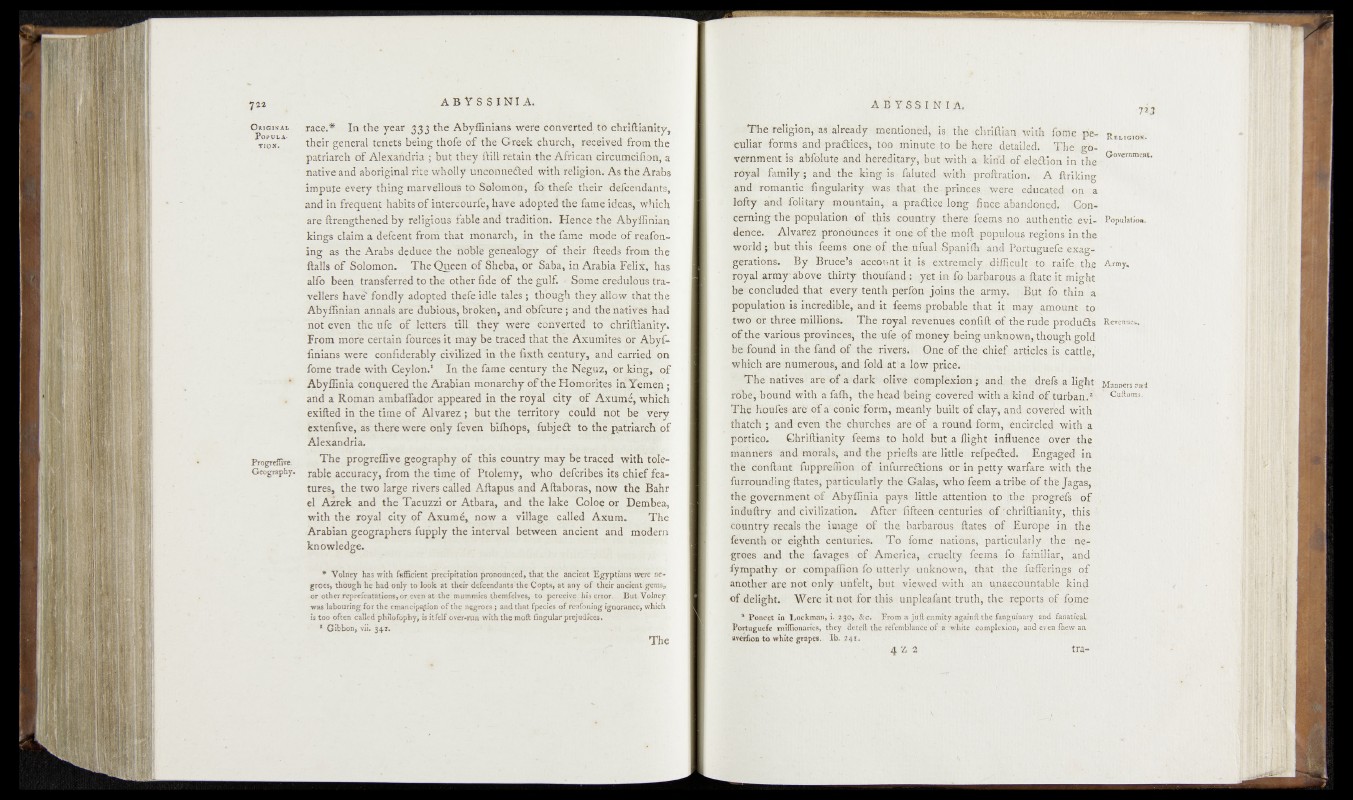
race.* In the year 333 the Abyffinians were converted tö ehriftianity,
their genét#!; tenets being thofe of the Greek church, received fromithe
patriarch of Alexandria ; but they ftill retain the African circutncifion, a
native and aboriginal rite wholly unconnected with religion. As the Arabs
impujo every thing m&rvéllóufi rib Solomon, fb thbfe their de|cèndants,
and in frequent habits of intercourfe, have adopted the fame ideas, which
afe ftrengthened by religious fable and tradition. Hence the Abyffinian
kings claim a defcent from that monarch, in the fame mode of reafon-
ing as the Arabs deduce the nöbfe genealogy of their fteeds from the
Rails of Solomon. The Queen of Sheba, or Saba* in Arabia Felix, has
alfb been transferred to the other fide of the gulf. * Some credulous tra*-
yellers have fondly adopted thefeidle tales;' though they allow' that the
Aby ffinian annals are dubious, broken, and'obfcure; and tbetiativ'és'had
höt qven the rife of letter# till they were converted to ehriftianity.
From mort certain fources it may be traced that the Axumites or Aoyfi-
finians were confiderably civilized in the fixth century, and carried on
fome trade with Ceylon.1 In. the fame century t,he Neguz, or king, of
Abyffinia conquered the Arabian monarchy of the Homorites inXemeri;
and a Roman ambaffador appeared in the royal city of Axumé, which
exifted in the time of Alvarez ; but the territory could not be very
extenfive, as there were only feven biffiops, fubje£t to the patriarch of
Alexandria.
The progreffive geography of this country may b'e traced with tolerable
accuracy, from the time of Ptolemy, who defcribes its chief features,
the two large rivers called Aftapus and Aftaboras, now the Bahr
el Azrek and the Tacuzzi or Atbara, and the lake Colo$ or Dembea,
with the royal city of Axumé, now a village called Axum. ^TThe
Arabian geographers fupply the interval between ancient and modern
knowledge.
* Volney has with fsfficient precipitation pronounced, that the ancient Egyptians were negroes,
though he had only to look at their defcendants'the Copts, at any o f their ancient gems,
or other reprefentations, or even at- the mummies themfelves, to perceive his error.. But. Volney.
was labouring for the emancipation of the negroes; and that fpecies of reafoning ignorance, which
is too often called philbfophy, is itfelf Over-run with the molt Angular prejudices.
• ‘ Gibbon, vii. 34a.
The
ABYSSINIA.
R eligion.
Government.
Army,
The religion, as already- mentioned, is the chriftian with fome peculiar
forms and»pm£biDes,: too minute to be here detailed. The government
is- aibf@lute and hereditary, but with a kirid-of-election in the
royal family; and the king is - faluted with prcffiration,. A ftriking
and romantic <fingnlarity was that the-princes,- were educated on a
hafty and foMtary mountain, a practice.dong finee abandoned, .Concerning
the population ,of .this country there deems no .authentic evi- Population,
dence. > Alvarez pronounces it on® of the moft pop^loup regions in the
world; but AisTeems onep£>;the?0fual §paniffi' and-Portugugfe exagr '
gerations. By Bruoe% 'aecowit itfS-is ex^remejy.’dif^cu}^ ,ta,raife the
royal army'ahove thirty fhoyfand-j .barharp^s^a ^.ate itmight
be«?<s^uded that every tenth perfon jqirjs vt;hp. army. • Byt fi> thin a
population is incredible, and it foetus,probable that .it may amount to
two of three millions. The royal revenues eo4fi<ft<©f the rude prqduds
of the various provinces; the'rife of mousy being urihnownjrthqugh^gold
b^ourii jn-bhe fa®4 of the rivets.. One of-the chief- a%qlesl5is, .cattle,
which ate numerous, and fold, at' a low price. »
The natives5 are of a dark’ olive complexion; and,, the. drefs* light
ibb^-houriS with a fafli, the head being covered withalkirid>of turban.*
The houfes are' of a' conic'fonn, meanly built of clay, and1,covered with
ffiatch ; and even the churches are of a round bfcfmj-iteckcled with a
portico. Ghriftianity feems to hold hut a flight influence over the
mfchri&T atid morals; and the priefts are little refpefited. Engaged in
thfe cotiftant fuppreffibnJ of; hifurredtions or in petty warfare with the
ftri#o«adifig#ates, particolafly the Galas*who feem a tribe, of thfe Jagas,,
the government of Abyffinia, -pays little attention to the .prQgrefs of
iriduftry and civilization. After fifteen centuries dfJlchriftiaait)5,j.'thfe i
country recals the image of the batbarOus ftates sof Europe in the
fevepth Of eighth centuries. To fome n-atibns, particularly the rter
groes and the favages of America, .cruelty feems fo familiar, .arid
fympathy or compaffion fo utterly unknown, that the fufferings of
another are not'only urifelt, but viewed with an unaccountable kind
of delight. Were it not for this unpleafant truth, the reports ofiTgme
* Poncet in Lockman, i. 230, See. From a juft enmity againft-the fanguioaty and fanatical
Portuguese jniffionaries, they deteft the fefciiiblaa'c'e of * white complexion, and even fhew an
avCrfion to white grapes. Ib. 241.
^farmers and